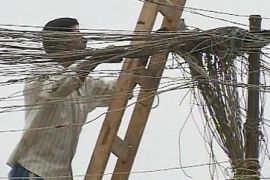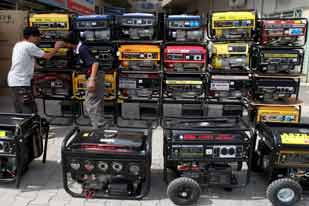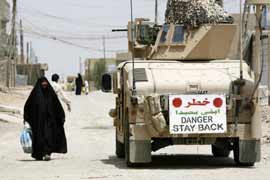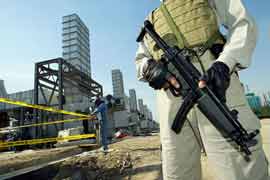Power struggle in Iraq
Iraqi cities have been living without adequate electricity for more than four years.

 |
| House generators business have flourished in Iraq |
An adequate electricity service remains one of the main dreams of Iraqi citizens, a promise as yet unfulfilled by the Iraqi parliament and government.
Homes have electricity for no more than a few hours at a time, with some staying without electricity for days.
As Iraq’s severe summer starts, life in temperatures higher than 50C is a nightmare.
The crisis has given birth to several makeshift solutions, including the sale of commercial public generators and smaller generators for the home.
On the shopping list
Huge generators are scattered throughout Iraq’s streets, their owners selling electricity to residents. Each generator supplies dozens of houses, but at a high cost to ordinary citizens.
| Your Views |
|
“Let the people of Iraq vote if they want the US to stay or leave” Bob Kaye, Bohemia, US |
Zuhal Ibrahim, 38, a widow, told Al Jazeera that she has to pay the monthly subscription to the public generators or the heat without air conditioning would be unbearable.
“I have to make a budget, it is not like in the past, you just pay an subsidised electricity bill; public generators sell us one ampere for 15,000 dinars a month ($11). We need five amperes which is around 25 per cent of my monthly income.”
Ibrahim’s sister Fawzia, 64, a retired government employee, said the public generators are the best solution available, but not perfect.
“It is true we cannot live without those generators, but their service is not hassle free,” she said.
“We suffer from several unexpected power failures a day. If a US tank or any huge military machinery passes the generator’s messy wires net, we are in trouble; it would take them quite some time to fix the wires.
“The generators also need service, which means we have to stay without electricity whenever maintenance is needed, which is also on a daily basis.
“Last month, the generator’s owner wanted a fee increase, we refused, he got angry and left us without electricity for days until a new guy took over.”
House generators
Small house generators have become a flourishing business in Iraq, as they are one of the few solutions available.
 |
| Military machinery often disrupts the electricity supply from the generators |
Qutaiba al-Ubeidi, 39, an economist, told Al Jazeera: “House generators are the bitter solution for the electricity problem. We hate them, but we cannot live without them. Ironic.
“In addition to their noise, which prevents you from enjoying anything while you are sitting at home, it has become a problem to get petrol for them. Ironically also, petrol is not easy to get in our rich-oil country.
“One litre of petrol costs you 1,500 dinars [$1] nowadays, while before the war and for several months after the war I used to fill my car’s tank for 1,500 dinars.”
A retired police officer, who asked to be identified as Abu Huthaifa, said: “We have stopped using house generators for moral reasons.
“I and the few houses in the neighbourhood noticed that the majority of our neighbours cannot afford house generators, hence, we find ourselves embarrassed to enjoy electricity inside our houses and others have to bear the noise of our generators. So we stopped using them, but I have to say it is not easy. Our brutal summer drives people crazy and it is very hard for kids and old people.”
Huge business
Iraqis believe that the trade in generators is one of the reasons why the shortage of electricity has not been solved.
Abu Hussam, a generator keeper, told Al Jazeera: “It is like a mafia business. There are VIPs out there, each one of them owns dozens of generators; then there are some businessmen, each one of them rents several generators from the big guys for certain amounts of money. At the end of the chain come the retailers, each one of them rents one generator and appoints someone like me to take care of its maintenance and collect money from subscribers.”
 |
| Karim: Iraqi power stations are under attack |
Dhafir al-Ani, a member of parliament, said the parliament asked Wahid Karim, the minister of electricity, to join a session last February to present his ministry’s plan to restore the electricity service.
“Mr Karim did attend a parliament session, where he was asked to clarify the reason why people do not have electricity, knowing that the electricity service was regular until the day the US forces entered Baghdad on April 9, 2003,” he said.
“He blamed the shortage of electricity on attacks on his ministry’s facilities. We could not get an elaboration on who is exactly attacking those facilities.
“The minister was defensive, and gave no vision for future plans. He was faced with information that some contractors are attacking the facilities, in order to win reconstruction bids. He acknowledged that he received such information, but he has no evidence to prove it.”
Karim has made many complaints about attacks on electricity facilities. Last October, he called for surveillance aircraft to be allocated to his ministry so that they could watch remote power plants.
Al Jazeera has tried over the past three days to get a comment from Wahid Karim, minister of electricity, Raad al-Haris, deputy minister of electricity, or Aziz Abu Tariq, the ministry’s spokesperson, but none of them was available to comment.